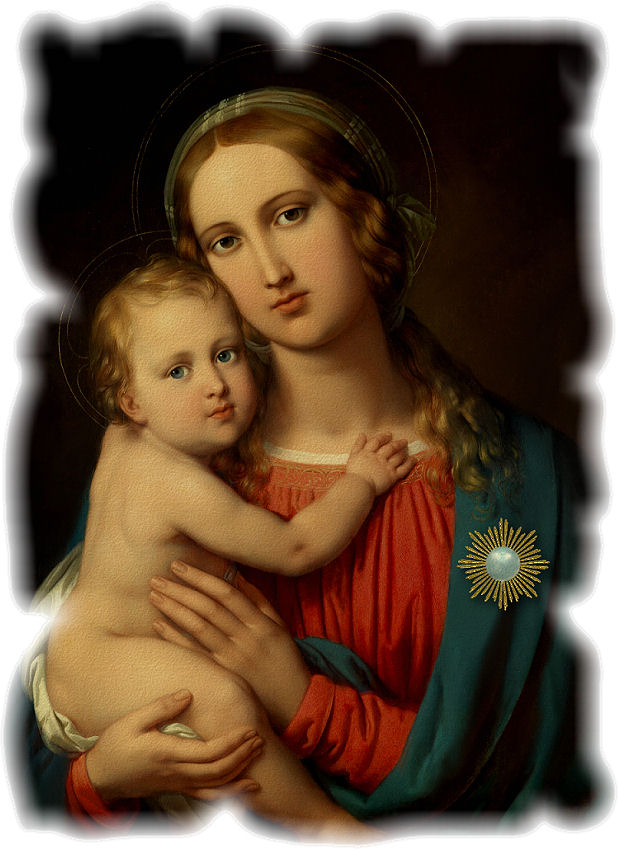  CHRISTIAN HOPE Taken from THE CATECHISM EXPLAINED Written by Fr. Francis Spirago; Edited by Fr. Richard Clarke, SJ with Nihil Obstat and Imprimatur, New York, 1927  Part 1 THE ESSENCE OF CHRISTIAN HOPE Christian hope is the confident expectation of all those things which Christ promised us with regard to the fulfillment of God's will. "Hope," says St. Paulinus, "gives us a foretaste of the promised joys of paradise." "How great is the multitude. of Thy sweetness, O Lord ... which Thou hast wrought for them that hope in Thee" (Ps. xxx. 20). Such hope may be called holy, because directed to God and supernatural things; by this is fulfilled the precept of the Apostle: "Seek the things that are above" (Col. iii. 1). 1. As the reward of carrying out God's will, Christ has promised us eternal happiness, and the means required for attaining it; in particular God's grace, temporal goods for the sustaining of life, forgiveness of sins, help in our necessities, and the answering of our prayers. Christ promised us eternal happiness (1 John ii. 25); "In the house of My Father are many mansions. If not I would have told you, because I go to prepare a place for you" (John xiv. 2); He has further promised to raise our bodies again after death (John v. 28). The desire for perfect happiness is planted deep in our nature. Christ also promised His grace, i.e., the help of the Holy Spirit, for His will is that all men be saved (1 Tim. ii. 4). Grace is absolutely necessary for salvation: actual grace for our conversion, sanctifying grace for entrance into Heaven. Temporal goods are promised: "Be not solicitous for your life what you shall eat, nor for your body what you shall put on. ... For your Father knoweth that you have need of all these things," and we are taught that since the Father feeds the birds of the air, and clothes the weeds of the field, much more will be His care for us (Matt. vi. 25-32). The experience of the Saints in this matter is a great consolation and lesson to us; over and over again they have been in difficulties for the means of subsistence, yet help always came. Forgiveness of sin is assured to us if we wish to amend: " There shall be joy in Heaven upon one sinner that doth penance, more than over ninety-nine just who need not penance" (Luke xv. 7). The parable of the prodigal son and of the lost sheep reveal to us how readily God will forgive the sinner.: "So long as we are on the earth it is never too late to repent," says St. Cyprian. The penitent thief on the cross found salvation. "God wills not the death of the sinner, but that he be converted and live" (Ezech. xviii. 32). We are certain of help in our necessities. When the Apostles were filled with fear at the storm on the lake, Christ's reproach to them was: "Why do you fear, O ye of little faith?" (Matt. viii. 26). God is called the "helper in tribulations" (Ps. xlv. 2). It is true He seems at times to delay answering our prayers, as in the marriage-feast at Cana, when He said: "My hour is not yet come" (John ii. 4); yet the longer we have to wait, the more wonderful is His answer, and we might reflect on the calming of the storm on the lake, on the release of St. Peter from prison, on the fate of Aman, the persecutor of the Jews (Esther vii.). [Emphasis in bold added.] "When our necessity is greatest," says St. Ambrose, "God's help is nearest." Christ promised that our petitions shall always be heard: "If you shall ask Me anything in My name, that will I do" (John xiv. 14). "Amen, Amen, I say to you; if you ask the Father anything in My name, He will give it you" (John xvi. 23). Christ taught us in the Our Father to ask our heavenly Father for all these things. The second petition is a prayer for salvation, the third for grace, the fourth for temporal necessities, the fifth for forgiveness of sins, the sixth and seventh for help in our needs. 2. Christian hope is based on faith, for we hope for the fulfillment of God's promises because we believe that God is infinitely true, infinitely powerful, and infinitely good, and that Christ has merited all for us. "We are firmly convinced," says St. Clement of Rome, "that He Who forbade deceit cannot Himself deceive." Hence the words of St. Paul: "Let us hold fast the confession of our hope without wavering, for He is faithful that hath promised" (Heb. x. 23). Moreover, we are convinced that God, to Whom nothing is impossible (Luke i. 37), is able to carry out His promises (Rom. iv. 18); that God, Who is love itself (1 John iv. 8), is more ready to give than we are to receive (St. Jerome); that Christ, by His death on the cross, has merited for us salvation and all things necessary for its attainment. Thus St. Augustine, "I could never hope for pardon or Heaven when I think of my great sins, but I venture to hope that through the merits of Christ I may be saved by means of penance and keeping of the commandments." 3. He only who carries out God's will can hope for the good things promised by Christ. "Not every one that saith to Me, Lord, Lord, shall enter into the kingdom of Heaven, but he that doth the will of :My Father Who is in Heaven" (Matt. vii. 21).  Hence the sinner can hope in God only when he really repents and is willing to reform his life. "Hope without virtue is presumption," says St. Bernard. [Emphasis in bold added.] If the wicked do penance for their sins and do judgment and justice, God will no more remember their sins (Ezech. xviii. 21). Manasses, King of Israel, led his people into idolatry and put the prophets to death. For this he was given over to his enemies and led in chains to Babylon. There he repented and promised amendment. God then set him free, and gave him back his kingdom, and Manasses destroyed the temples of the idols and did much good (2 Paralip. xxxiii.). The just man may hope that God will provide for all his needs; yet he must exert himself to gain those things which he hopes for from God. Christ's words are: "Seek first the kingdom of God and His justice, and all other things shall be added unto you" (Matt. vi. 33). We are God's servants. As St. John of the Cross says: "It is our affair to serve the Lord; it is His to provide for us." No one who has been faithful to God's commands has ever been abandoned by Him (Ecclus. ii. 12). "We are unjust to God if we do not place great confidence in Him," says St. Augustine. [Ibid.] "Cast all your care upon the Lord, for He hath care of you" (1 Pet. v. 1). We must not, however, desist from exerting ourselves; we must use those gifts which God has given to us; for God will give us only what we cannot obtain by our own exertions. [Ibid.] In the words of St. Charles Borromeo: "We must hope for the best and do our best." "To expect help and to do nothing," says St. Francis of Sales, "is to tempt God." We ought to employ the natural means at our disposal; St. Paul, for example, though he had the gift of healing sickness, recommended Timothy to take a little wine for the sake of his health (1 Tim. v. 23). And all this is true of any kind of necessity: "Help yourself and God will help you." 4. A wholesome fear of falling into sin must always accompany Christian hope. God's will is that we should work out our salvation in fear and trembling (Phil. ii. 12). No one has complete assurance that he belongs to the number of the elect, or that he will persevere in virtue till death (Council of Trent, 6, Can. 15, 16). Many an old and rotten ship has reached harbor, while many a great and noble vessel has sunk in the sea. Men, illumined of God, like Solomon, have fallen into godless ways before their death, and many a great sinner, like St. Augustine or St. Mary Magdalen, has become a very great Saint. "He that thinketh himself to stand take heed lest he fall" (1 Cor. x. 12). " We carry our treasure in frail and earthen vessels" (2 Cor. iv. 7). "Mistrust of ourselves," says St. Augustine, "should help us to hope." Hope and fear are companions; where they reign, the heavenly crown is easily secured (St. John Chrysostom). [Ibid.] Hope makes us strong and fear makes us prudent. Hope is like the breeze to a ship, driving it in to the harbor; fear is like the ballast, steadying it and preventing shipwreck. Fear, so far from diminishing hope, increases it. "Trust in God and distrust of ourselves," says St. Francis of Sales, "are like the two arms of a balance; as one rises the other goes down; the more we distrust ourselves, the more we confide in God, and vice versa." 5. Christian hope is necessary for salvation. A man who has no hope will not do good works, nor avoid sin; while he who has hope is secure of his salvation, just as a man is certain of a plant when he has the seed; "for we are saved by hope" (Rom. viii. 24). "Belief in God's truth, His almighty power, and His love for us, is a triple cord," says St. Bernard, "which is let down into our prison from Heaven; to this we must cling so that it may raise us to the vision of His glory." "The house of God (i.e., holiness which leads to salvation),"says St. Augustine, "is founded on faith, built up on hope, and finished in love." In Heaven there is no more hope, for we shall then possess all that we hoped for. 6. Christian hope is a gift of God and we can attain to this hope only by sanctifying grace. In this respect we may speak of hope almost in the same words in which we spoke of faith. It is the Spirit of God which awakens in us a longing for heavenly things, and fills us with confidence in God. As sanctifying grace increases, this power of hoping increases; hence the Saints hoped most at the approach of death. Hope, like a river, becomes wider as it approaches the sea. DOWNLOAD THE IMAGE OF THE MADONNA AND CHILD PLAIN NOTE: WE EMBELLISHED THE CLOAK OF OUR LADY, THE ORIGINAL STAR WAS NOT IN GOOD CONDITION.   HOME------------------------------------TRADITION www.catholictradition.org/Tradition/christian-hope1.htm |